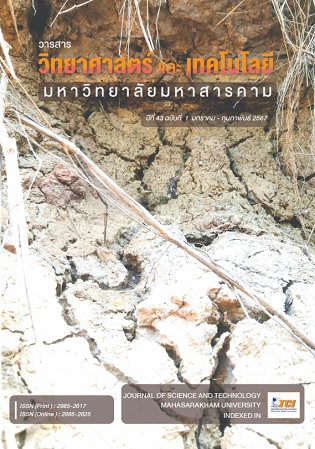The situations of online game addiction and effects: A case study of undergraduate students, Khon Kaen University, 2021
Main Article Content
Abstract
The 2021 report by the Mental Health Department presented those Thai children played games on average 5 hours a day, affecting adverse emotional and addiction states. This research aims to study the impact of online games from an undergraduate student at Khon Kaen University, 2021 academic year, on 5 the impacts of (1) health, (2) learning, (3) family and social relationships (4) Emotional and mental health (5) Financial. This is survey research using questionnaires from 420 subjects in 3 major groups: Health Sciences (Health), Science and Technology (SC&TE), and Human and Social Sciences (Huso). Descriptive and inferential statistics were used for data analysis. The results showed that 51.67% of subjects were female, 31.67% were first-year students, 33.57% were interested in MOBA games, and 83.33% played games for entertainment and relaxation propose. Most of the subjects played games at dormitories and homes 88.10%, 46.19% played games between 6.01–10.00 p.m., spending 2 hours and 11 minutes on average per day, and the GPA average was 2.76. The Game Addiction Screening Test (GAST) could divide the level of game addiction into 3 groups: 55.24% of non-gaming and 17.86% of game addicting. The remainder is frantic group. The average GPA in the non-gaming group was higher than others. The average hours of games playing, and time spent on games per month were lower than others (p<0.01). The proportion of game addiction was significantly different between levels of addiction (p<0.01). There was a statistically significant relationship between the level of game addiction and subgroups (p<0.01); SC&TE had a higher proportion of game addiction than other groups. If focusing between the frantic and the game addict group, there could not found a difference in the 5 impacts mean between the 3 subgroups (p>0.05). The impacts mean in males was higher than in females (p<0.01). Mental health was not different. The comparison between the game-addicted and the frantic group found in 5 impacts mean, the game-addict group was significantly higher than the frantic group (p<0.01).
Article Details
References
กฤตนัย แซ่อึ้ง,นรินทร์ รมณ์ชิต,พงศ์ศักดิ์ แก้วประทีป ,วิทวัส กองจันทร์,วีรวุฒิ นาคนวล,สหรัฐ บัตรพิมาย.(2559). การศึกษาพฤติกรรมการเล่นเกมออนไลน์ของนักศึกษามหาวิทยาลัยราชภัฏนครราชสีมา. มหาวิทยาลัยราชภัฏนครราชสีมา.
กุลนรี หาญพัฒนชัยกูร, เอมอร บุตรอุดม, ทิพย์รัตน์ อุดเมืองเพีย, สุกัญญา รักศรี, ภาสีนี โทอินทร์ และสุดา หมื่นไธสง. (2564). พฤติกรรมและผลกระทบจากการติดเกมของนักเรียนชั้นมัธยมศึกษา โรงเรียนในเขตเทสบาลนครขอนแก่น. วารสารศูนย์อนามัยที่ 9, 15(38), 561-573.
จุฬาลักษณ์ โกมลตรี, (2555). บทความพิเศษ : การคำนวณขนาดตัวอย่าง. วารสารสุขภาพจิตแห่งประเทศไทย, 20(3), 192-198.
ชลดา บุญโท.(2554). พฤติกรรมการเล่นเกมออนไลน์ของนักศึกษามหาวิทยาลัยเทคโนโลยีราชมงคลธัญบุรีและผลกระทบจากเกมออนไลน์. มหาวิทยาลัยเทคโนโลยีราชมงคลธัญบุรี
ชาญวิทย์ พรนภดล บัณฑิต ศรไพศาล, กุสุมาวดี คำเกลี้ยง, เสาวนีย์ พัฒนอมร. (2557). การพัฒนาแบบทดสอบการติดเกม. วารสารสมาคมจิตแพทย์ แห่งประเทศไทย, 59(1), 3-14.
ไทยรัฐออนไลน์. (2563). เด็กไทยร้อยละ 5 ใช้ชีวิตติดเกมขั้นหมกมุ่น. https://www.thairath.co.th/news/ society/198830.
สายสุดา ปั้นตระกูล. (2553). พฤติกรรมการเล่นเกมออนไลน์ของนักศึกษา มหาวิทยาลัยราชภัฏสวนดุสิต ชั้นปีที่ 1.วารสารปัญญาภิวัฒน์,3(1), 47-58.
สำนักงานคณะกรรมการสุขภาพแห่งชาติ (2564). ผลวิจัยชี้เด็ก-เยาวชน ติดเกมเฉลี่ย 5 ชั่วโมง/วัน ค่าใช้จ่าย 5,000 บาท/เดือน. https://www.nationalhealth.or.th/th/node/3006
สำนักงานสถิติแห่งชาติ. (2563). สำรวจการมีการใช้สารสนเทศและการสื่อสารในครัวเรือน พ.ศ. 2563. กรุงเทพมหานคร. http://www.nso.go.th/ sites/2014en/Survey/ICT/Survey%20In%20Household/2020.
สุชาดา กีระนันท์. (2542). ทฤษฎีและวิธีการสำรวจตัวอย่าง. โรงพิมพ์จุฬาลงกรณ์มหาวิทยาลัย.
Cochran, W. G. (1977). Sampling techniques (3rd ed). John Wiley and Sons.
Hinkle, D.E, William, W., & Stephen G. J. (1998). Applied statistics for the behavior sciences (4th ed). Houghton Mifflin.
TNN ONLINE. (2564). สถิติใหม่เผย "ไทยใช้เน็ตเล่นเกมเป็นอันดับ 3 ของโลก". https://www.tnnthailand.com/news/tech/98037/


